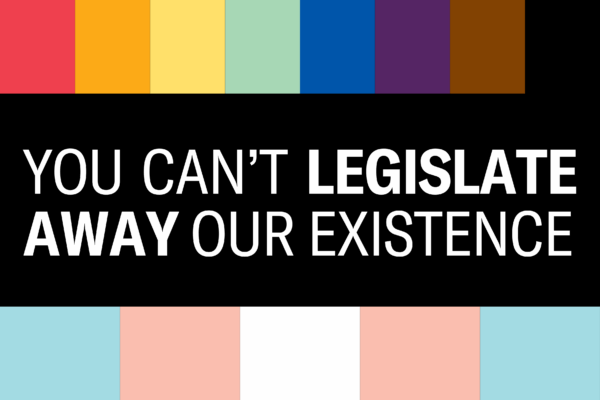Every year in June, the LGBTQ+ community celebrates Pride Month - often a time for joy and visibility, but one borne out of resilience in the face of adversity. This year, we are facing an increased number of legislative attacks, with four deeply problematic anti-LGBTQ+ bills on their way to Governor Sununu’s desk.
As we closeout an unprecedented legislative session where over a dozen anti-LGBTQ+ – and specifically anti-transgender bills - were brought forward at the State House, a shadow looms ominously over the LGBTQ+ community in the Granite State as we await the Governor to act on these bills.
As Policy Advocate at the ACLU of New Hampshire, I’ve followed these bills closely. It is explicitly clear that this slate of legislation invites discrimination and would create serious harm for LGBTQ+ people and particularly to transgender youth.
One bill headed to the Governor’s desk, HB 396, would roll back critical anti-discrimination protections that were passed with bipartisan support just six years ago (and signed into law by Governor Sununu). Specifically, this bill would sanction the unequal treatment of transgender people in bathrooms and locker rooms, on sports teams, in safer carceral housing placements, and other spaces. It would permit various entities, whether it be privately-owned restaurants, or state-run prisons and public schools, to deny equal access based solely on one’s transgender status.
Another bill making its way to the Governor’s desk, HB 1205, is a sports ban that would expressly prohibit transgender girls from playing on public school or club sports in grades 5 through 12. This bill is a violation of our rights, and these types of trans-exclusionary sports bans incite online vitriol and cruelty directed at transgender youth.
At the State House, this bill has prompted countless pleas to legislators from the teens and parents whose lives would be turned upside-down should this bill become law. We know that transgender students participate in sports for the same reasons any other young person does: to challenge themselves, improve fitness, and be part of a team. According to the American Psychological Association, having the opportunity to participate in sports results in positive outcomes for students, too; better grades, greater homework completion, higher educational and occupational aspirations, improved self-esteem, and newfound friendships.
Let's be clear: when a law or policy excludes all transgender women from spaces and activities designated for women solely because they are transgender, it is discriminatory. The same applies to transgender men.
And this is not new ground: the U.S. Supreme Court and other federal courts across the country have weighed in on these issues a number of times, like in Bostock v. Clayton County, where the Supreme Court reaffirmed that the scope of the Civil Rights Act encompasses protections for transgender and LGBTQ individuals against sex-based discrimination. The same reasoning has been applied by federal courts of appeals in other contexts to protect against discrimination, like credit and lending, healthcare, and educational settings.
In fact, just this April, the United States Court of Appeals for the Fourth Circuit determined that West Virginia's sports ban, which served as the model for HB 1205, violated the rights of a transgender girl who was excluded from the girls' cross-country and track teams. The Court resolved that the law’s sole purpose and effect was to prevent transgender girls from playing on girls' teams and that the ban treated the plaintiff, a transgender girl, worse than people to whom she was similarly situated and deprived her of any meaningful athletic opportunity on the basis of sex.
In New Hampshire, we’ve heard politicians say countless times that transgender girls should simply “play on the boys’ team.” But the courts have weighed in on that, too: in the Fourth Circuit opinion the Court recognized that the “choice” between not participating in sports and participating only on boys’ teams is no real “choice” at all.
Beyond the legislative and legal implications of bills like HB 1205 and HB 396, they signal to LGBTQ+ people and kids that New Hampshire lawmakers and possibly the Governor are okay with creating an environment that is less safe, full of hateful rhetoric, and with laws built on policies that have no legal or moral ground.
According to a 2023 report from the UCLA Law Williams Institute, there are currently over 78,400 LGBTQ+ people living in the Granite State, and they deserve respect, dignity, and equal rights under the law – and are entitled to equal opportunities.
We urge Governor Sununu to veto this slate of unjust and harmful bills and uphold the values and beliefs that are true to the Granite State because, as Governor Sununu himself said in 2018, “Discrimination - in any form - is unacceptable and runs contrary to New Hampshire’s Live Free or Die Spirit.

